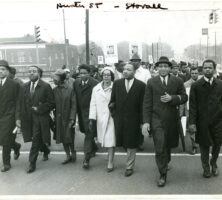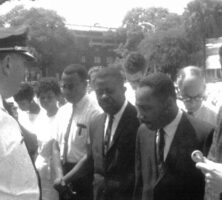Ralph David Abernathy was Martin Luther King Jr.’s chief partner in the civil rights movement. He helped to organize the Montgomery bus boycott in Alabama and the Southern Christian Leadership Conference (SCLC) in Atlanta. After King was assassinated in 1968, Abernathy succeeded him as SCLC president and continued the practice of nonviolent resistance as a means of achieving equality for Black Americans. In May and June 1968, just a month after King’s assassination, Abernathy led the Poor People’s March on Washington, D.C.

Background and Early Career
Ralph David Abernathy was born in Linden, Alabama, on March 11, 1926. The son of a farmer, he served in the army during World War II (1941-45) and afterward enrolled at Alabama State University in Montgomery, Alabama. He graduated with a degree in mathematics in 1950, two years after he was ordained a Baptist minister in 1948. His involvement in political activism began in college when he led demonstrations protesting the lack of heat and hot water in his dormitory and the dreadful food served in the cafeteria. In 1951 he earned an M.A. degree in sociology from Atlanta University (later Clark Atlanta University) and then became pastor of the First Baptist Church in Montgomery, Alabama. While in Montgomery he formed a close and enduring partnership with Martin Luther King Jr.
The Montgomery bus boycott of 1955-56, sparked by Rosa Parks’s refusal to relinquish her bus seat to a white man, inspired King and Abernathy to establish the Montgomery Improvement Association. This group provided leadership for the successful boycott of the city’s segregated bus system. The boycott marked the beginning of the civil rights movement. In the hope of building upon this victory, Abernathy and King, along with other Black southern ministers, established the Southern Christian Leadership Conference. Their goal was to form an organization that would supply the civil rights movement with sustained leadership. King was elected president, the Reverend C. K. Steele was named vice president, and Abernathy became secretary-treasurer. Committed to the nonviolent struggle for civil rights, the SCLC adopted the motto “Not one hair of one head of one white person shall be harmed.”

In 1961 Abernathy became pastor of the West Hunter Street Baptist Church in Atlanta and was named SCLC vice president, thereby becoming King’s lieutenant and eventual successor. Also in 1961 Abernathy and King were summoned to Albany to lead a boycott of the city’s segregated public transportation system. Although they arrived in Albany with high enthusiasm and noble goals, the results in what became known as the Albany Movement were far from triumphant. Abernathy and King were arrested several times and soon left southwest Georgia without resolving the problems there.

King’s Torch Is Passed
When King was assassinated on April 4, 1968, Abernathy succeeded him as SCLC president. His new responsibilities provided him little time to mourn the death of his friend. Less than a week after the assassination, Abernathy led a march to support striking sanitation workers in Memphis, Tennessee. The following month, he assumed leadership of the SCLC’s Poor People’s Campaign. Hoping to bring attention to the plight of the nation’s impoverished, he constructed huts in the nation’s capital, which precipitated a showdown with the police. Ignoring orders to remove the huts, he was jailed for nearly three weeks.

Abernathy’s decade-long tenure as SCLC president was marked by internal tension between factions competing for control of the organization’s direction. He was frustrated by the growing dispute between younger, more militant members, who advocated protests and dramatic actions, and older, more conservative members, who favored more traditional measures like marches. Under Abernathy’s leadership the SCLC’s fund-raising campaigns were less than successful, which placed the organization on an unstable financial footing. Abernathy resigned in 1977 amid accusations of financial mismanagement, leaving a once substantial and prominent civil rights organization in decline. That same year he ran for a Georgia congressional seat and lost.
After vacating his leadership post in the SCLC, Abernathy resumed his work as a full-time minister in Atlanta. He received many awards, most notably honorary degrees from Long Island University in New York, Morehouse College in Atlanta, Kalamazoo College in Michigan, and his alma mater, Alabama State University. A major Atlanta highway is named in his honor. His autobiography, And the Walls Came Tumbling Down, was published in 1989. He died in Atlanta on April 17, 1990.

















